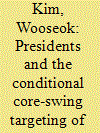| Srl | Item |
| 1 |
ID:
141092


|
|
|
|
|
| Summary/Abstract |
How does the Chinese Communist Party (CCP) secure the loyalty of its coercive leaders, and its public security chiefs in particular, in the face of numerous domestic protests every year? This article presents the first quantitative analysis of contemporary China's coercive leaders using an original data set of provincial public security chiefs and public security funding during the reform era. I demonstrate that the CCP, owing to its concern for regime stability, has empowered the public security chiefs by incorporating them into the leadership team. Empowered public security chiefs then have stronger bargaining power over budgetary issues. I rely on fieldwork, qualitative interviews and an analysis of Party documents to complement my statistical analysis. The findings of this analysis shed light on the understanding of regime durability, contentious politics and the bureaucracy in China.
|
|
|
|
|
|
|
|
|
|
|
|
|
|
|
|
| 2 |
ID:
182592


|
|
|
|
|
| Summary/Abstract |
In this article, I present a theory of conditional core-swing targeting that focuses on the competition for majority control in legislative elections to explain how presidents use their strong budgetary powers to manipulate the distribution of the national subsidy in South Korea. Presidents whose parties already possess a legislative majority are expected to favor core municipalities to strengthen the foundations of their majority constituency, whereas those who seek majority control are predicted to prioritize swing municipalities in an effort to cross the majority threshold. Presidents are also anticipated to respond to the electoral cycle by shifting subsidies to riskier municipalities when elections approach. Using a novel data set on national subsidy allocations that spans three decades, I find evidence in favor of the hypotheses. This article demonstrates that the beneficiaries of distributive favoritism are not fixed, and that politicians can engage in complex and varied targeting strategies to achieve their objectives.
|
|
|
|
|
|
|
|
|
|
|
|
|
|
|
|